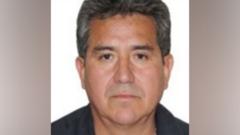In a significant legal action, the Bolivian government has extradited Maximiliano Dávila, a former director of its anti-drug agency, to the United States to face serious drug trafficking charges. Dávila, who is also known as "Macho," was sent to the US after being approved for extradition by Bolivia's Supreme Court in late November. He has been imprisoned since February 2022 on unrelated corruption charges and denies all allegations against him.
The charges against Dávila include accusations that he facilitated cocaine smuggling to the US during his tenure as head of the Bolivian Special Forces for the Fight Against Drug Trafficking (FELCN). According to the US Department of State, Dávila misused his official position by safeguarding planes transporting cocaine for distribution in the United States. If convicted, he could face a minimum of ten years and potentially life imprisonment.
This extradition resurfaced tensions between Bolivia and the United States, particularly concerning past incidents involving the US government's involvement in Bolivian drug policy. Ex-President Evo Morales, who governed from 2006 to 2019, criticized the extradition on social media, referencing it as a sign that Bolivia has once again become a "US Colony." Morales, who has a contentious history with the US following his expulsion of the US ambassador and DEA in 2008, condemned the decision by stating that it violates international agreements by extraditing Bolivians before local trials occur.
The political ramifications of the extradition extend beyond Dávila's legal situation. Morales is currently under investigation for allegations of statutory rape and human trafficking, charges he vehemently denies. His supporters have been involved in protests tied to this investigation, arguing against what they see as harassment by the Bolivian government.
The extradition of Dávila serves as a focal point in ongoing debates about drug trafficking policies in Bolivia, the influence of the US in Latin America, and the struggle for national sovereignty amid international demands for compliance in drug enforcement efforts. As the situation unfolds, the implications for Bolivia’s internal politics and its relationship with the US remain critically important issues.




















